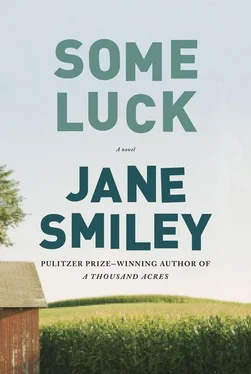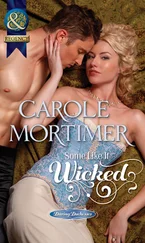THINGS WERE EXPECTED from Frank now that he was almost five. Every night before bed, he was to lay his clothes for the next day out on the floor, just as if there had been a person in there (himself) and the person had flown away (or gone to bed). Then, in the morning, he had to put them on before he came downstairs to feed the chickens and the horses (Papa fed the hogs and the sheep himself). His coat was by the door, and he put on that himself, too, along with his cap and his mittens. His boots were on the porch. While Papa was putting his boots on, Frank put his boots on. Sometimes he put them on the wrong feet, but if he did, he had to walk out in them — there was no time to change, because the animals were hungry.
First they carried oats and hay to the horses — Frank poured the oats out of the bucket into their feed trough while Papa forked them some hay. Then they got another bucket of oats, and Frank walked around the chicken yard, throwing it to them, while Papa checked the nests for eggs. Sometimes, when there were a lot of eggs, Frank got to carry a few of them into the house, but he had to be careful so that the eggs didn’t break. Eggs were food and eggs were money — Frank understood those concepts perfectly well.
When they got back to the kitchen, Joey would be sitting in the high chair, eating whatever Mama had made for breakfast, and Mary Elizabeth would be in her basket on the table, looking up at the ceiling. Frank liked to go over to her and jump up and down. Sometimes that made her cry, but the point was not to make her cry, just to make her jerk her head or lift her hands or kick her feet. Mama always said, “Be nice to your sister, Frankie.”
“I’m nice,” said Frankie.
“Hmp,” said Papa.
Joey just looked at them, his head turning back and forth, Frank to Mama to Papa, back to Frank. Joe never went out to feed the horses or the chickens. That was Frank’s job.
Frank got to lead the horses to pasture, too. First Jake. Papa put the thing called the halter around Jake’s head, and put the rope in Frank’s hand, and Frank stepped forward very straight and didn’t look back, and when they got to the gate of the pasture, Papa had already opened it, and he led Jake through and turned him around. Then they stood there until Papa took off the halter, and they stepped back and Papa closed the gate. They followed the same procedure with Elsa. On good days, Papa let him ride Jake, but never Elsa. Elsa was a little “marish” and not completely trustworthy, Papa said. Frank led the horses back from the pasture in the afternoon. This was a job he was especially proud of.
What was fun and not a job at all was sitting on the seat of the Ford and putting both hands on the steering wheel and pretending to turn it — left, right. If he had been going anywhere, he would have had to stand on the seat, which wasn’t allowed, but it was more fun to sit and make noises. What made him laugh was to make a noise like they were going over a bump and then bounce up and down on the seat.
For Mama, he had jobs, too. He pulled up the covers on his and Joey’s bed, with the pillows under the orange quilt that Granny Elizabeth had made for them, and he picked up his dirty clothes and Joey’s dirty clothes and put them in a basket. Joey’s dirty clothes were dirtier than his. It was hard not to feel that Joey was a disappointment, since, as Papa said, he was a terrible whiner, and always had to be told to stop. Frank was well aware that he himself never whined. Joe also had nightmares and cried out in the night, so Frank had taken the job on himself, without being told by Mama, to shake Joey if he was having a bad dream and wake him up. Sometimes he shook him pretty hard, but no harder than Papa shook him.
Frank was also learning to read. He wasn’t old enough for school yet, but Mama had gotten the book from the teacher, and Frank could read almost the whole thing already. It was easy. And every time he read another page, Mama threw her arms around his neck and said, “Oh, darling Frankie, you are going to be president, aren’t you?”
WHAT JOE LIKED was a little peace and quiet once in a while. Right now, sitting on the lowest step of the front porch, was about perfect. His tormentor, Frankie, had gone somewhere — who knew where, and who cared? — and Mama was in the house, changing Mary Elizabeth. She knew Joe wouldn’t walk away when he’d been told to stay put, and so did he. She had given him a box of dominoes, his favorite box of things, and he was laying them side by side on the second step, making sure that their corners touched. Mama had counted the dots for him, showing him that some dominoes had more dots and some fewer, but Joe didn’t care about the dots except insofar as he thought they were pretty against the black of the rectangle. What he liked was seeing a whole row or, better, a bed of dominoes, all flat and straight and with no extras. It was very upsetting to lay out the bed the way it should be and still have dominoes in the box, or, worse, to lay it out and run out of dominoes while there was a space to be filled. He suspected that there was a way of knowing ahead of time whether it would turn out, but he didn’t know what that way was. He also knew that Frankie came around from time to time and took dominoes out of the box and out of the row and out of the bed, and then he would keep them, or throw them so that Joe would have to find them, or he even put them in his mouth and made them come out like a tongue when Joe asked for them. Mama only very rarely caught Frankie doing this. Whenever Joe tried to say something important about Frankie, he was told not to be a whiner. So, even though he was preoccupied with Frankie and all of the things Frankie did to him, there wasn’t anything he could think of to do about it.
He stood up and looked at his row of dominoes. It was pretty long. Joe smiled.
FRANK PRESSED HIMSELF deep into the sofa, hoping to hide sufficiently from Mama so that, when she came down the stairs from putting Joe to bed, she would not see him and so not put him to bed. He felt that a great wind was blowing inside of him, and that it would blow him right out of the bed and back down the stairs if she took him up there and laid him down. He hid as best he could, and he also made himself a little rigid — harder to pick up, and easier to protest that way.
Here she came.
And then she did look, but she only bit her lip and went into the dining room. Frank relaxed, sat forward again, and looked at all the faces. Yes, Granny Mary. Yes, Eloise. Yes, Uncle Rolf. Yes, Grandpa Otto. Yes, Oma and Opa. These and others were perfectly familiar. But in addition to them, there were Tom, who was seven, and Henrietta, who was six, and Martin, who was nine. These were his Second Cousins, according to Rosanna, and they lived very far away, in a city where there were no cows, no hogs, no chickens, and not even any horses, only tall buildings and hard roads and many, many automobiles. The Second Cousins were visiting for Thanksgiving and staying with Granny Mary.
“Oh me,” said Opa, “stuffed. How does that happen, I ask you?”
“Opa,” said Granny, “you can eat your fill of the goose or eat your fill of the pie, but not both.”
“Ja, ja, ja,” said Opa. “Still, I am stuck in my chair, never to move again.”
Mama, who had come back into the room, leaned down and kissed Opa on the top of his head, where there was no hair.
Papa said, “If we laze about like this, we’ll fall asleep. We should play a game.”
Granny said, “Something fun for the youngsters, Walter.”
Papa looked at him, Frank, and then at Mama, and Mama said, “He can stay up for a little bit.” But Frank sat quietly, knowing that Mama could change her mind at any moment.
Then he was at the kitchen table, with all the rest of them, kneeling on a chair, and Martin was on one side of him and Henrietta on the other side of him. He leaned forward, against the edge of the table. In his hand, he had a string, and the other end of the string was tied around a cork. Frank knew all about corks, because he and Joe played with corks in the bathing tub. If you pushed a cork down under the water, it would pop up, and sometimes pop completely out. Corks were fun. All the corks, nine of them, were lying in a circle in the middle of the table, and each cork had a string. In addition to the kids, Granny Mary and Opa and Papa were playing. Papa set the green dice on the table. Frank sometimes played with the dice, too, counting the dots and adding the two numbers together. Papa thought it was good practice for him. Joe could not even count the dots. Right in front of him, Frank also had a little pile of beans — ten beans. Papa had asked him to count them when he put them in front of him. Nothing hard about that, but all the faces smiled. Frank understood easy as you please that these beans were his money, and he wanted more.
Читать дальше












